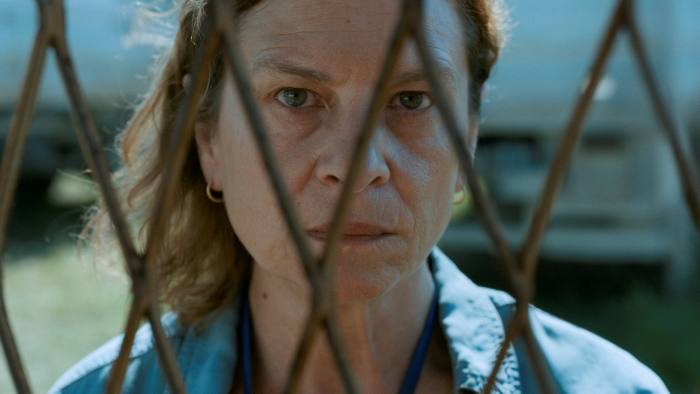|
Jasna Ðuričić in Quo Vadis, Aida (2021) Set during the Bosnian war, Quo vadis, Aida is a devastating dramatization based on the Srebrenica genocide that took place in July 1995. Prior to the genocide, the United Nations had declared this small town a “safe zone” under UN protection. The town was then invaded and captured by the Serbian army. 30,000 Bosnian civilians were expelled from their homes and left looking for shelter. 8,372 Bosnian men and boys were murdered. For her fifth feature film, writer-director Jasmila Žbanic avoids explicitly showing the violence of such atrocities. She stays with the citizens, showing the solidarity between people who are displaced and who are desperately holding onto a semblance of promise. The story is told from a fascinating perspective, that of a woman walking through two worlds with the weight of both on her shoulders.
The titular character Aida (Jasna Ðuričić) is a translator for the UN in Srebrenica. When the Serbian army takes over the town, her husband Nihad (Izudin Bajrović) and son Ejo (Dino Bajrović) are among the civilians looking for shelter, while her son Hamdija (Boris Ler) is at a full-capacity UN base with her. The majority of the film takes place at this base, where thousands of civilians (and thousands more outside the gate with nowhere else to go) await news of what comes next. All the while, their fates have been cruelly decided. As an interpreter, Aida is one of the first to learn crucial information about what's going on behind closed doors. Given the horrific failings by the UN, Aida wrestles with taking care of her family while also doing her job. Quo vadis, Aida is a haunting, collective experience that transcends the screen and makes an unforgettable emotional impact. The film opens with a conversation about the fate of 30,000 people. Aida is sat at a table interpreting negotiations between Serbian forces and UN peacekeepers. What will be done to ensure the civilians’ safety? Will everyone be moved to a shelter? While this scene is full of blatant false promises, Žbanic still maintains a sense of lingering hope which can also be felt deeply throughout the film, through her depiction of the humanity in this community of civilians. Characters are sometimes heard in the background calling Aida’s name to ask for help, or because they want her to explain what’s going on. These are her neighbours, her friends, people she went out dancing with (as seen in a haunting flashback that lingers on many of their faces). 30,000 civilians were displaced, and everyone had their own story. The fictional character of Aida is not based around one person, but on countless experiences of women who lived through the atrocities of what happened. As a result, Žbanic’s discussions with women and research on witness documents helped shape the protagonist. Jasna Ðuričić gives a tour de force performance as Aida. She carries the weight of this story with unrelenting humanity. From the moment she appears on screen, it’s clear that she is the one to lead this journey and carry the film on her shoulders. Ðuričić maintains an extraordinarily immersive, visceral connection and commands every second of her screen time. Her performance is a stunning reflection of a character existing in two worlds; Aida’s destiny is linked to everyone else’s, and at the same time, her job provides a window of security that she uses to benefit her family as much as she can. She’s in an emotionally draining position of having to make such crucial decisions on the fly. She's also carrying the weight of her role as UN interpreter, having to translate dire news to thousands of Bosnian civilians who have no clue what’s going to happen and whom she cannot protect. In addition to Ðuričić’s performance, and a wonderful supporting cast who make this experience all the more immersive to watch, one of the film’s greatest strengths is the screenplay. Žbanic maintains a strong depiction of how dehumanization starts with language, and how quickly words crumble in the face of pressure. During the few negotiation scenes in this film, only words are spoken and there is still an immense feeling of tension polluting the air. Žbanic also brings a lot of focus onto interesting dynamics between Aida and the civilians, to whom she is connected, yet her access gives her a level of protection not afforded to them. Aida shares compelling dynamics with each of the characters she comes into contact with, including the UN officials whose failed response during a time of need propels her to take matters into her own hands. Quo vadis, Aida is a harrowing journey and a compelling film to watch unfold. It’s a powerful depiction of history that raises awareness about the Srebrenica genocide and the lives that were so brutally taken. It’s a resonating story about solidarity, humanity, and hope bringing people together. It’s a phenomenal showcase of Jasna Ðuričić’s talent, as she plays a mother who will do absolutely anything in her power to protect her family. Filmmaker Jasmila Žbanic explores so many layers of this subject matter from an invigorating point of view, and poses a reminder that Aida’s perspective is a collection of so many real-life experiences.
0 Comments
Leave a Reply. |
Archives
June 2024
Categories |


 RSS Feed
RSS Feed